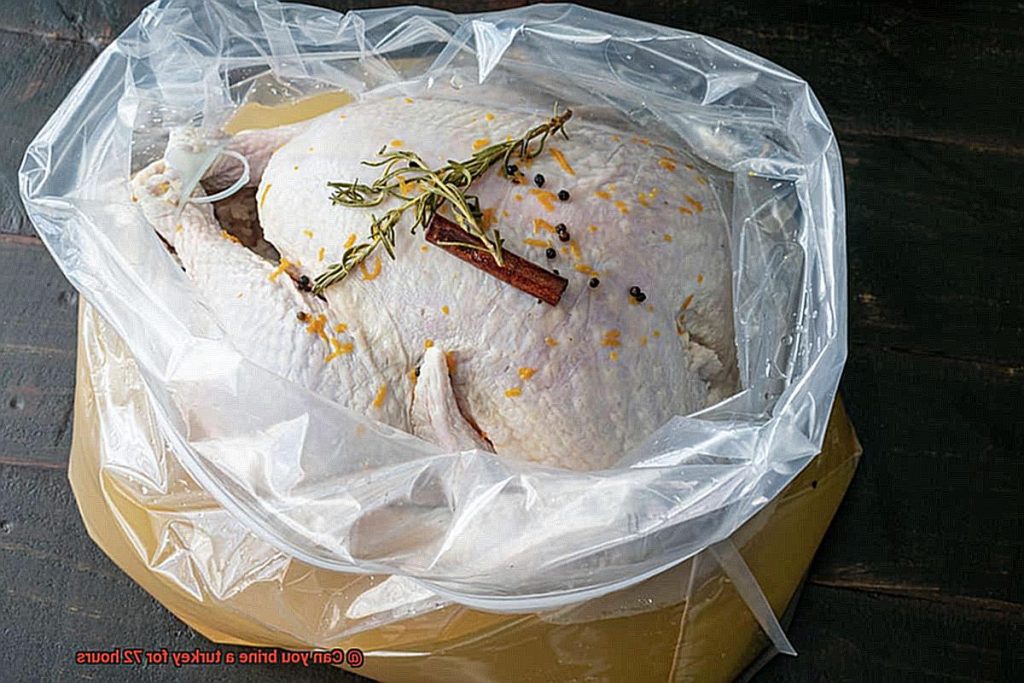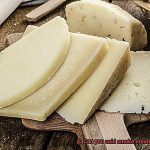Thanksgiving is just around the corner and if you’re anything like me, you’re already thinking about the turkey. It’s the centerpiece of the meal, after all. And when it comes to cooking a turkey, brining is a popular technique that can make all the difference. But how long should you brine your bird for maximum flavor and tenderness?
The culinary community is divided on this topic. Some say a quick few hours in a brine will do the trick, while others recommend up to 24 hours. But what about 72 hours? Is it safe or even possible?
In this blog post, we’re going to answer the question that’s on everyone’s mind: can you brine a turkey for 72 hours? We’ll dive into the science behind brining and explain why it works so well. We’ll also discuss the factors that affect how long you should brine your turkey and whether or not a 72-hour soak is too long.
So if you’re looking to take your turkey game to the next level this Thanksgiving and want to know everything there is to know about brining, keep reading.
Contents
What is Brining?
Brining is the secret weapon that every home cook should have in their arsenal. It’s a process that involves soaking meat in a saltwater solution before cooking, and the results are nothing short of magical.
The first benefit of brining is that it adds moisture to the meat. No one wants to bite into a dry, tough turkey or chicken, and brining ensures that even if you accidentally overcook your meat, it will still be juicy and tender. The salt in the brine solution works its magic by breaking down the proteins in the meat, allowing it to retain more moisture during cooking.
The second benefit of brining is that it adds flavor to the meat. You can customize your brine solution with herbs, spices, citrus, or any other flavors you desire. When you cook the meat, those flavors will infuse into every bite, making it taste like you spent hours on preparation when really all you did was soak it in a solution.
Now let’s talk turkey (or any other meat). To make a basic brine solution for turkey, you’ll need water, salt, sugar, and any additional flavorings you desire. The amount of salt and sugar needed will depend on the size of your turkey and how long you plan to brine it for. A general rule of thumb is to use 1 cup of salt and 1 cup of sugar for every gallon of water used.
Once you’ve mixed your brine solution, submerge your turkey in it and let it sit in the refrigerator for 12-24 hours. It’s important to note that while it is technically possible to brine a turkey for 72 hours, it’s not recommended as it can make the meat overly salty and mushy.
When it’s time to cook your turkey, remove it from the brine solution and pat it dry with paper towels. You don’t need to rinse off any excess brine because it has already done its job. Cook the turkey as you normally would and enjoy the juiciest, most flavorful bird you’ve ever tasted.
Brining is not just limited to turkey. You can use this technique with a variety of meats, including pork, chicken, and fish. Experiment with different flavorings and brining times to find your perfect combination.
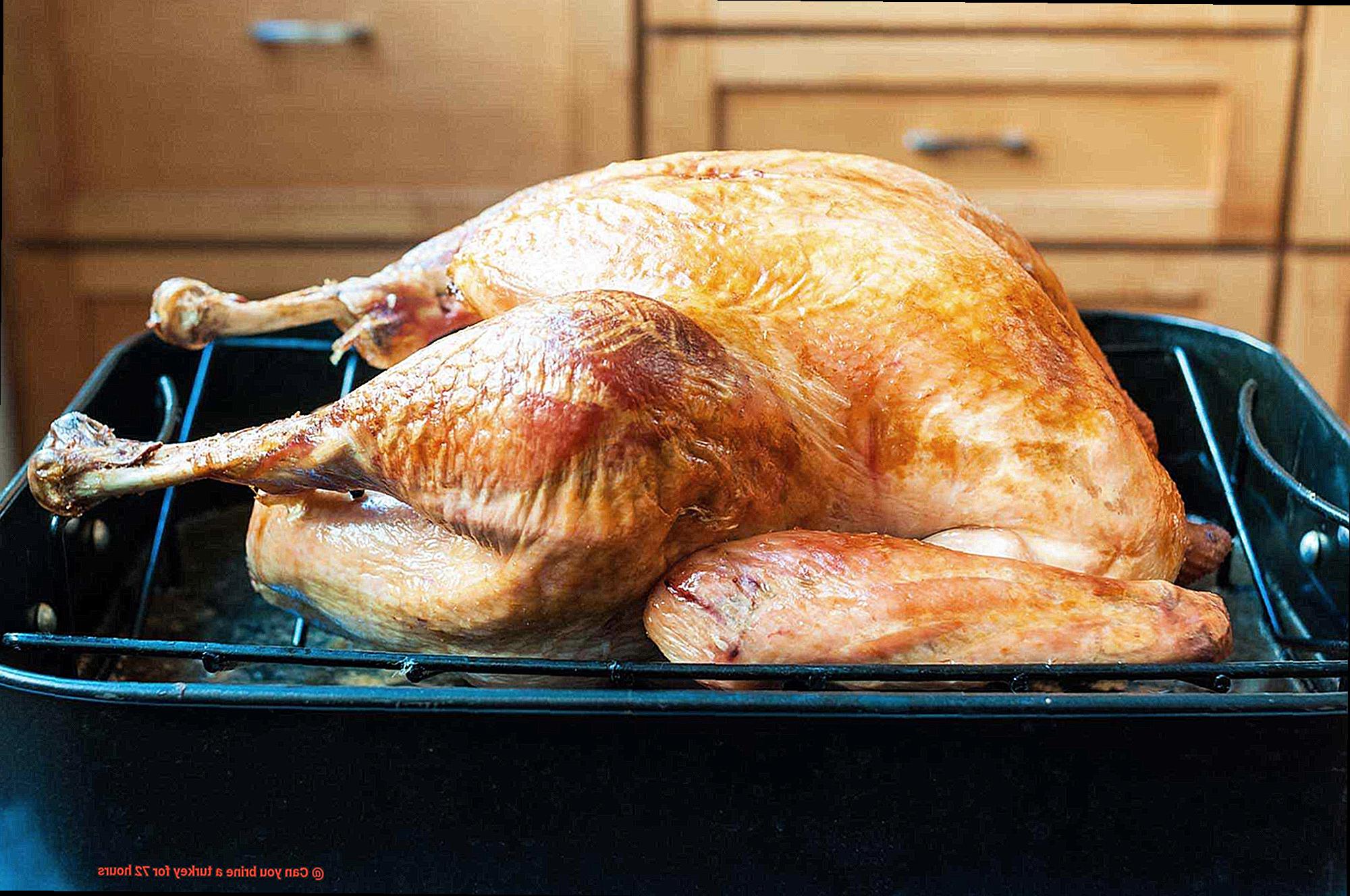
Is it Possible to Brine a Turkey for 72 Hours?
Brining is the way to go. But, have you ever wondered if it’s possible to brine a turkey for 72 hours? As an expert on the subject, I’m here to give you the answer.
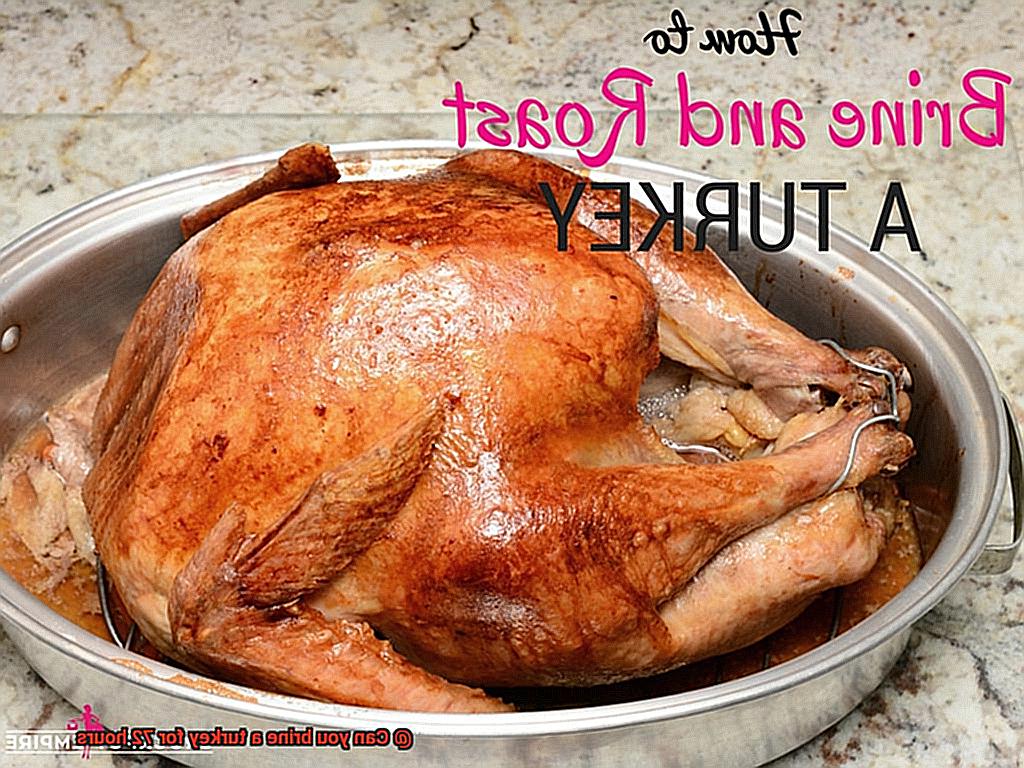
Yes, it is possible to brine a turkey for 72 hours, but there are some important things to consider before attempting it. Firstly, the longer the turkey stays in the brine, the more salt it will absorb. To avoid an overly salty bird, use less salt in the brine than you would for a shorter period of time.
Food safety is another crucial consideration when brining a turkey. Poultry must not be left in the temperature danger zone (40-140°F) for more than two hours to prevent harmful bacteria growth. If you plan on brining a turkey for 72 hours, make sure that the bird remains at a safe temperature throughout the entire process. You can do this by keeping the turkey and brine mixture refrigerated or using a cooler with ice packs.
Lastly, over-brining can change the texture of the meat and make it mushy. To avoid this, monitor the turkey closely and remove it from the brine as soon as it reaches your desired level of tenderness.
To recap, here are some essential tips for brining a turkey for 72 hours:
- Use less salt in the brine
- Ensure food safety by keeping the turkey at a safe temperature
- Monitor the turkey closely to avoid over-brining
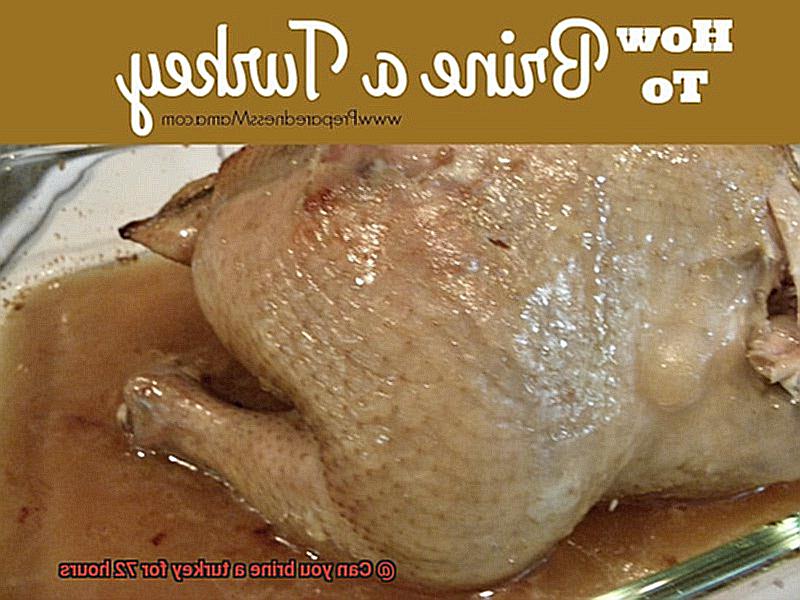
Benefits of Brining a Turkey for 72 Hours
Yes, you read that right – three whole days of soaking the bird in a salt and spice solution can elevate your turkey to new heights of deliciousness.
So, what makes a 72-hour brine so special? Let’s explore the benefits:
- Deep, Well-Infused Flavor: A longer brine time allows the salt and seasonings to fully penetrate the turkey, infusing every inch of meat with delicious flavors. No more dry or flavorless turkey here.
- Tender and Moist Meat: The extended brining time helps to break down the muscle fibers in the turkey, resulting in more tender and juicy meat. The salt in the brine also helps the meat hold onto more moisture during cooking, so you’re left with succulent and delicious meat.
- Forgiving Cooking: Even if you accidentally overcook your turkey, a 72-hour brine can help ensure that it stays moist and tender. The meat has absorbed so much moisture from the brine that it can withstand a little extra time in the oven without drying out.
Of course, it’s important to keep in mind a few things before diving into a 72-hour brine. Firstly, use less salt in the brine than you would for a shorter brining time to avoid overly salty meat. Secondly, keep your turkey at a safe temperature during the entire process to prevent food safety concerns. Lastly, be aware that not all turkey recipes or cooking methods are suitable for a 72-hour brine – for example, deep-frying your turkey is best left to shorter brining times to avoid dangerous oil splatters.
Safety Considerations When Brining a Turkey for 72 Hours
Before diving in, there are several safety considerations that must be taken seriously. As an expert, I have compiled some research notes to help you ensure that your turkey is not only delicious but also safe to consume.
First and foremost, it’s essential to use a food-grade container for brining the turkey. A plastic, glass, or stainless steel container is ideal. However, avoid using aluminum or copper containers as they can react with the acidic brine solution. Additionally, ensure that the container is large enough to hold both the turkey and the brine solution with enough space for circulation.
Secondly, always refrigerate the turkey during the brining process to prevent bacterial growth. The temperature should be below 40°F (4°C), so if you don’t have a container that can fit in your fridge, you can place it in a cooler with ice packs to keep it cool.
Thirdly, use a brine recipe that is specifically designed for an extended period of time. Some recipes include additional ingredients such as vinegar or citrus juice to increase acidity and inhibit bacterial growth. It’s crucial to use a safe recipe to prevent potential foodborne illness.
Lastly, always use a meat thermometer to check if the turkey has reached a safe internal temperature of 165°F (74°C) before consuming it. This will kill any harmful bacteria that may have grown during the brining process.
The Best Brine Solutions for Longer Brines
When it comes to a longer brine, it’s crucial to use the best brine solutions that strike the perfect balance of salt, sugar, and flavor to keep your bird moist and delicious. As an expert in the field, I’m here to share some tips on the best brine solutions for longer brines.
First on our list is the classic salt and sugar solution. This no-fuss recipe involves dissolving 1 cup of kosher salt and 1 cup of brown sugar in 1 gallon of water. The result is a clean, simple flavor that can keep your turkey submerged for up to 72 hours.
However, if you want to add some complexity to your turkey’s taste profile, consider using a blend of herbs, spices, and citrus fruits in your brine solution. A common recipe includes ingredients like bay leaves, thyme, orange peel, garlic, and black peppercorns. Not only will your turkey be flavorful, but your kitchen will smell heavenly throughout the cooking process.
But why stop there? For an even more unique taste experience, try adding liquids like apple cider or beer to your brine solution. This will infuse the bird with a distinct flavor that will have your guests raving about your culinary skills.
It’s important to note that when using a longer brine solution, you must rinse the turkey thoroughly before cooking. This will remove any excess salt or sugar from the surface of the bird to prevent it from becoming too salty or sweet during cooking.
How to Prepare and Store the Turkey During the Brining Process
Brining a turkey is a fantastic way to ensure that it is succulent and flavorful, but it’s essential to know how to prepare and store the bird during the brining process. With proper preparation and storage, you can avoid bacterial growth, keep your turkey safe to eat, and produce a meal that is sure to impress.
Begin with a Fresh Turkey
The first step in preparing a turkey for brining is to ensure that it is fresh, uncooked, and completely thawed. Remove any giblets or organs from the cavity and rinse it inside and out with cold water. Pat the turkey dry with paper towels before placing it in the brine solution.
Prepare the Brine Solution
Use a large container that can accommodate both the turkey and the brine solution. A food-grade plastic bucket or large stockpot are good options. Prepare the brine solution according to your recipe with the appropriate amount of salt, sugar, and any other desired spices or herbs.
Submerge the Turkey
Place the turkey in the brine solution, making sure that it is fully submerged. If necessary, add more liquid to completely cover the bird. Cover the container with a lid or plastic wrap to prevent any contaminants from entering.
Keep Refrigerated
Keep the container with the turkey in the refrigerator at all times during the brining process. If you don’t have enough space in your fridge, you can use a cooler filled with ice packs or frozen gel packs.
Monitor Temperature
It’s important to monitor the temperature of the brine regularly to ensure that it stays below 40°F. This will prevent bacterial growth and keep the turkey safe to eat. If you’re brining for longer than 24 hours, consider using a food thermometer to check the temperature periodically.
Rinse and Pat Dry
After the brining process is complete, remove the turkey from the brine solution and rinse it thoroughly with cold water. Pat it dry with paper towels before cooking according to your preferred method. Discard the brine solution as it may contain bacteria and should not be reused.
Tips For Making the Most of Your 72-Hour Brine
Get ready to take your turkey game to the next level with these essential tips for making the most of your 72-hour brine. Brining a turkey for this length of time may seem intimidating, but by using these techniques, you’ll have a juicy and flavorful bird that will leave your guests raving.
Salt Ratio
The first step to achieving the perfect brine is to use the correct ratio of salt to water. Aim for one cup of kosher salt for every gallon of water. This will ensure that your turkey is properly seasoned without being too salty. Don’t be tempted to add more salt, as it can lead to an overly salty flavor.
Submerge the Turkey
It’s important to make sure that your turkey is fully submerged in the brine mixture to ensure that it’s evenly seasoned. Use a heavy plate or pot lid to weigh it down and keep it fully submerged throughout the entire brining process.
Keep it Cool
Keeping your turkey at a safe temperature during the brining process is crucial. Ideally, aim for a temperature between 34-40 degrees Fahrenheit by placing your brining container in the fridge or using ice packs or frozen water bottles to keep the temperature down. It’s important to remember that bacteria can grow rapidly at warmer temperatures, so don’t leave your turkey out at room temperature.
Allow Time to Dry
Allowing the turkey skin to dry out before cooking is key to achieving a crispy and flavorful skin. After removing the turkey from the brine, let it dry uncovered in the fridge for a few hours or overnight, depending on its size.
Experiment with Flavors
One of the best things about brining is that you can add additional flavors and ingredients to customize your turkey flavor. Try adding herbs, spices, citrus fruits, or even beer or cider for added complexity and depth of flavor. Just be sure to balance the flavors carefully and avoid overpowering the natural taste of the meat.
Personal Preference and Experimentation in Determining Ideal Brining Time
Brining is the secret ingredient that transforms an ordinary bird into a succulent masterpiece. But how do you determine the ideal brining time? The answer is simple: personal preference and experimentation.
The first step in determining the ideal brining time is considering the type of brine being used and the size of the turkey. A stronger brine with higher salt content may require less time than a milder brine. Similarly, a smaller turkey may need less time in the brine compared to a larger bird. However, contrary to popular belief, longer brining times are not necessarily better.
While it is possible to brine a turkey for 72 hours, it’s important to note that this extended brining time may not necessarily result in a better-tasting turkey. In fact, it could potentially lead to an overly salty bird with a mushy texture. Therefore, experimentation is key to finding the ideal brining time.
Here are some factors to consider when experimenting with brining times:
- Salt Ratio: Experiment with different ratios of salt to water to find the perfect balance for your taste preferences. Too much salt can result in an overly salty bird, while too little can result in a bland taste.
- Flavor Additions: Don’t be afraid to add herbs, spices, citrus, or even beer or wine to your brine for added flavor. This can enhance the taste of your turkey and make it stand out from the crowd.
- Temperature: Keep your turkey cool during the brining process by submerging it in a cooler filled with ice. This helps prevent bacterial growth and keeps your bird safe to eat.
- Drying Time: After removing your turkey from the brine, allow it to air dry in the refrigerator for at least 12 hours before cooking. This helps create a crispy skin and prevents excess moisture during cooking.
- Personal Preference: Ultimately, the ideal brining time will depend on personal taste preferences. Try different durations until you find the perfect balance of flavor and texture.
shQ274aMHLQ” >
Conclusion
In conclusion, brining a turkey is a culinary game-changer that can transform a bland bird into a succulent and flavorful masterpiece. While there’s no one-size-fits-all answer to how long to brine a turkey, it is possible to safely and tastefully brine for 72 hours with proper planning.
By infusing the meat with moisture and flavor, brining creates a juicy and tender texture that will have your taste buds singing. The key is finding the right balance of salt and water, typically one cup of kosher salt per gallon of water, but don’t be afraid to experiment with herbs, spices, or even beer or cider for added depth.
When determining your ideal brining time, consider factors such as salt ratio, temperature control, drying time, and personal preference. However, beware of over-brining which can lead to an overly salty and mushy bird. With careful monitoring and experimentation, you’ll find the sweet spot for your perfect turkey.
To ensure safe preparation and storage during the brining process, use a food-grade container that can accommodate both the turkey and the brine solution. Keep everything refrigerated at all times while monitoring the temperature regularly. And don’t forget to rinse the turkey thoroughly before cooking.
This Thanksgiving season, elevate your culinary skills by taking on the challenge of brining your turkey.

